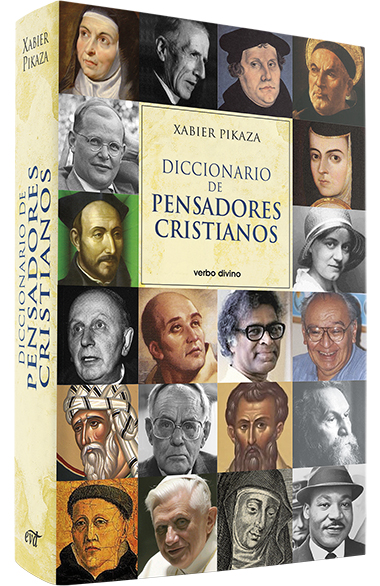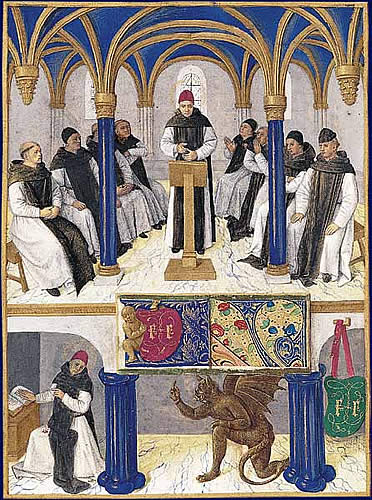Monk, theologian, mystic. promoter of the Cistercian reform and inspirer of the Second Crusade, one of the most important men in Medieval Europe. He was French (Burgundian), from a noble family, and at the age of 23 he entered the Benedictine branch of Cîteaux (in Citeux, Burgundy), with several of his relatives. He founded, shortly after, the monastery of Clairvaux, of which he was abbot until his death. The Cistercian reform that he fostered (both in a male and female line) provided a basic impetus for twelfth- and thirteenth-century European thought, both in the line of social organization and in the quest for mystery.
Christian life, a way of God.
Bernardo was a man passionate about the extension of the Kingdom of God, understood in the form of spiritual search and social transformation. Throughout his life, he founded and organized, throughout Western Europe, more than seventy monasteries that marked with his presence the spirituality and theology, politics and Christian life of the territories. He was a popular preacher and intervened in almost all the social and religious controversies of his time. He contributed to the foundation of the Order of the Templars and preached the Second Crusade (year 1146), which was a failure. But he was above all a knight of God, at the culmination of the great feudal (sacral) traditions of Europe. His controversy with → Pedro Abelardo, who represented a new way of understanding theology and Christian life, which was open to speculative discussion and freedom of opinion, is significant. More than the nascent speculation (typical of the first scholasticism of the twelfth century), he was interested in the deployment of the inner experience, linked to the Benedictine tradition, reread from the Song of Songs. That is why he was opposed to a type of rational dialectic that, in his opinion, prevented the clear development of grace and the interior experience of the mystery.
He interpreted spiritual life as a display of love by which God and the monk (the contemplative) are linked in the most intimate of the soul, on a path in which all the planes of life are linked, starting from the sacred hierarchy, which he understood as a free and loving revelation of the mystery of God. That is why he wanted his monks to be “liberated” for the interior life, in sobriety and poverty, in deep spirituality, regularly marked by the “divine order” of life that radiates and expands from the monasteries to the social environment and cultural.
Along these lines, he has been one of the great creators of the mystical, monastic and knightly Europe of the new Middle Ages. He was a demanding and hard man, a radical knight of God, who would have turned Christianity into a “monastery of God”, into a sacred liturgy at the service of the mystery. His monks and monasteries transformed the vision of Europe in a few decades, initiating an art that would quickly lead to the Gothic.
He was a man of love and highlighted the importance of devotion to Mary, the mother of Jesus, understood in a cordial way (the antiphon is attributed to him Hail Regina), so that many consider him the “Marian doctor” par excellence. Despite the problems and questions raised by his radicalism, Bernardo was perhaps the last great Knight of God, at the service of a sacred Christianity. Significantly, his memory of him and his spiritual theology (their devotion to him) have been and continue to be recognized and accepted by many subsequent theologians, both Catholic and Protestant.
A special theme. The Jesus Militia.
The influence of Saint Bernard in the development of thought and life in Europe has been and continues to be considerable, both in the field of the mysticism of the love of God, and in the way of understanding monasticism and the organization of society. He was a man who linked the experience of the mystery with action at the service of the Church. His contribution to the experience of love and inner freedom was considerable, as recognized by both Catholics and Protestants, who admire him in a special way. Having said that, I want to recall a point that for us seems “darker” in his memory, a facet of his political thought, linked to the Holy Crusade and the founding of the Order of the Temple, which he interprets as a sign of a new revelation of God. .
This facet must be understood from their own social and religious situation, in a time marked by apocalyptic hope, within a Church that was seeking its social identity, appealing, if necessary, to military-type means:
«A new Militia has been born, precisely in the same land that one day visited the sun that rises from above (Jesus), becoming visible in the flesh. In the same places where he dispersed with a strong arm the Chiefs who dominate in the Darkness, this militia now aspires to exterminate the sons of infidelity in their current satellites, to disperse them with the violence of their courage and also liberate their people. , raising up for us a force of salvation in the house of David, his servant” (De laude novae militiae. Ad milites Temple 1, in Complete works of Saint Bernard I, Madrid 1983, 496-543).
Bernardo thus offers a warlike rereading of the Benedictus (Lk 1, 67-79) starting from the Old Testament, and giving another meaning to a text that Luke (or the Christian author of his song) had demilitarized. Through Jesus, who is born poor and dies without fighting in a military way, God has won according to Luke the oppressive powers (cf. Eph 6, 12), opening to humans a space of universal peace and gratuitous communion. Well, contrary to that, Bernard it remilitarizes old words, bringing them back into their Old Testament matrix.
In the same land of Jesus, as ministers of his holy war, the new Knights of the Temple are determined to exterminate the children of anger or infidels (cf. Eph 2, 2; 5, 6), to liberate oppressed believers , thus giving rise to the great kingdom or horn of salvation of God on earth (cf. Lk 1, 69).
This text therefore places us in the context of the eschatological war. The military religious fight, at the same time, against the enemy soldiers of this world (Muslims) and against the diabolical powers of evil. These new crusaders, defenders of the Temple that Jesus had criticized (and symbolically destroyed), remain at the center of a battle that, expressing itself in worldly forms, confronts the princes of good (Christ) and those of evil (Devil).
PFor this reason, this war is the sacrament of his life: «March, then, soldiers, confident in combat and charge bravely against the enemies of the cross of Christ (cf. Phil 3, 18), certain that neither life nor death they will be able to deprive you of the love of God that is in Christ Jesus (cf. Rom 8, 38), who accompanies you in every moment of danger, telling us: If we live, we live for the Lord; if we die, we die to the Lord» (De laude 2: cf. Rom 14, 8).
The words that Paul used in a figurative sense (internal struggle), to thus express the giving of life as a process of unity with the Paschal Lord, are already understood in a warlike way. Bernardo has not sacralized the war itself. He knows that the fight between Christians constitutes a murder and for no reason can it be proclaimed and carried out (ibid. 3). However, he understands the crusade war as holy war, an expression of the victory of Jesus over the enemy forces of evil:
«But the soldiers of Christ (cf. Gal 5, 26) confidently fight in the battles of the Lord, without any fear of sinning by putting themselves in danger of death and by killing the enemy. For them, dying or killing for Christ does not imply any criminality and brings great glory… Christ willingly accepts the death of the enemy as revenge and even more willingly gives himself (gives himself) as consolation to the soldier who dies for his cause. That is to say, the soldier of Christ kills with certainty of conscience and dies with even greater certainty… He does not sin as a murderer, but acts, one could say, as a malicious one who kills the sinner to defend the good: he is considered as defender of Christians and avenger of Christ on evildoers…
The death of the pagan is a glory for the Christian, for by it Christ is glorified… It is not that we must necessarily kill the pagans, if there are other means to stop their offensives and repress their violent oppression against the faithful. But in the current circumstances his death is preferable, so that the scepter of the wicked does not weigh down the lot of the righteous (cf. Ps 124, 3), lest the righteous stretch out their hand to wickedness» (Ibid. 4 ).
Bernardo places himself, in this way, in an apocalyptic context, interpreting the crusade (and the function of the military religious of the Temple) as an episode of the war of the end of time, a war in which they, the Cistercian monks , collaborated with his prayer and his withdrawal from the world. The mystical experience of the encounter with God is situated in that same context, an encounter that thus appears as fulfillment and fulfillment of the great struggle of the forces of good (of love) against the enemy forces. The problem is that these “enemy forces” were made up of human persons, whom Jesus Christ had also redeemed (according to the Christian vision of life and history).
Text taken from Pikaza, Dictionary of Christian Thinkers

Plays
The works of Saint Bernard they have been collected in PL 182-183. Spanish translation, such as introductions and comments in: Complete works of Saint Bernard (Madrid 1947). see also The praises of Mary and other selected writings (Madrid 1998);In praise of the new militia: the Templars (Madrid 2005);in the school of love (Madrid 1999); Treatise on the love of God (1997).
About Saint Bernard: MD Yanez, Saint Bernard of Clairvaux (Burgos 2001); A. Luddy, Saint Bernard. The twelfth century of Christian Europe (Madrid 1963); Th Merton, Saint Bernard, the last of the Fathers (Madrid 1956); S. Quarry, Saint Bernard or the Middle Ages in its fullness (Madrid 2001); G.Duby, Saint Bernard and Cistercian art (Madrid 1992); J. Leclercq, Saint Bernard: monk and prophet (Madrid 1990).
20.8. Bernard of Clairvaux (1090-1153). Founder, mystic, singer of the crusades

